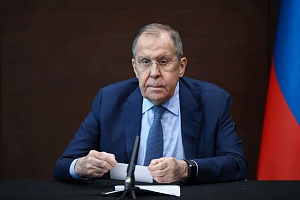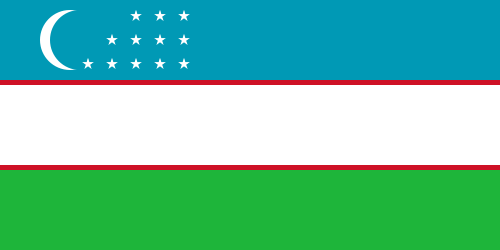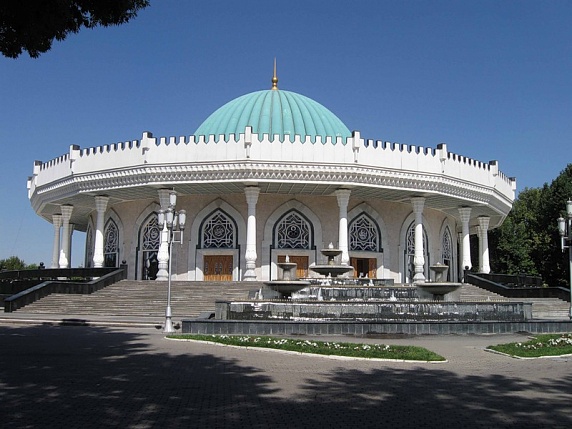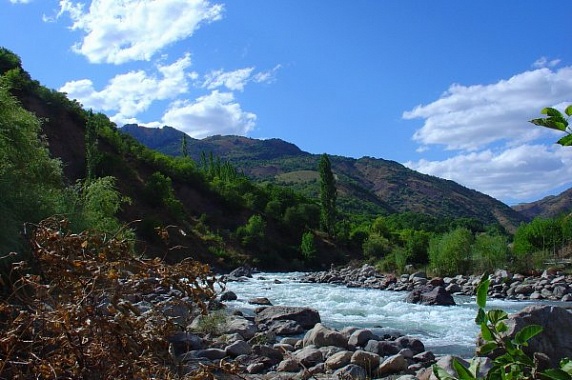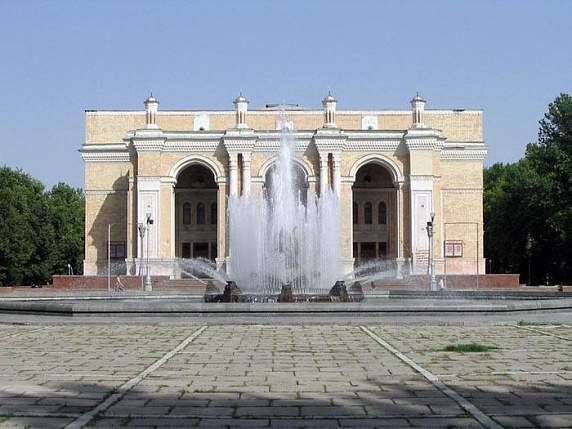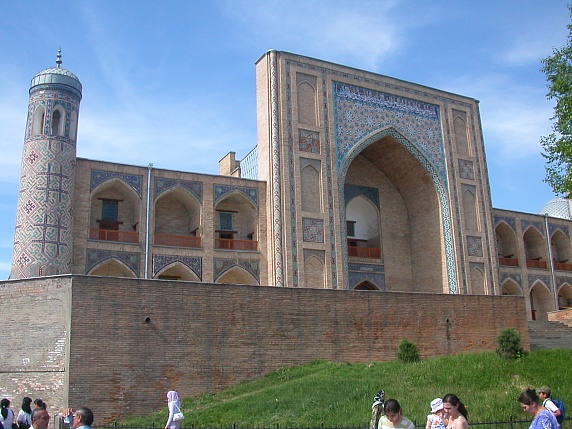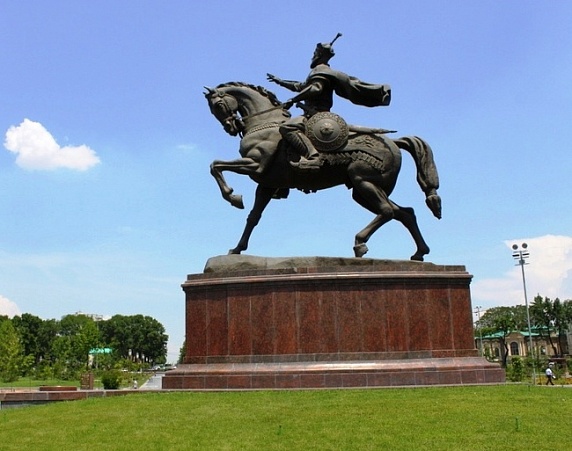 Республика Узбекистан
Республика Узбекистан
Foreign Minister Sergey Lavrov’s remarks and answers to media questions following the Antalya Diplomacy Forum, Antalya, March 2, 2024
Good afternoon,
Our participation in the latest Antalya Diplomacy Forum is drawing to a close. This is a relatively new political science format initiated by President of Türkiye Recep Tayyip Erdogan.
Unfortunately, last year we were unable to assemble due to a massive earthquake in Türkiye, which required the concentration of all efforts to coordinate the relief operations and help the victims. At that time, Russia was one of the first countries to lend a helping hand. We sent search and rescue teams, construction materials, and provided humanitarian assistance.
This year we are making up for lost time. It is a very representative conference, with participants from more than a hundred countries, including at the level of heads of state and government. There are many representatives at the level of foreign ministers. Taking this opportunity, through you, I would like to once again thank our Turkish colleagues for their hospitality and warm welcome.
While taking part in the conference, we used the opportunity to hold special panel sessions, with my participation, where we drew the international community’s attention to the consequences of the policy pursued by the US-led collective West with open disregard for the principles of the UN Charter, above all, the principle of respect for the sovereign equality of all states.
The West is using the current international situation to push through its rules, on which it believes the world order must be based. In fact, when you start analysing these rules, they signify only the [Western countries’] desire to continue acting in neocolonial ways, to live at the expense of others. We can see this in the events unfolding in Europe, the Middle East, East Asia, including the East China Sea and other regions of the world.
We believe that the Global Majority, which is increasing its leverage in all respects, such as the global economy and policy, understands that it is necessary to go back to the roots and to the principles of the UN laid down by the founding fathers, which the West is now simply not only ignoring, but also flagrantly violating.
I hope the discussion was useful. All the other panel events and the plenary session, where President of Türkiye Recep Tayyip Erdogan spoke, also emphasised the need to rethink where we are and how we relate to our international obligations.
The UN is not a bad organisation. Let me stress once again that its Charter contains all the principles necessary to ensure fairness in international relations. Those who had decisive weight in the world economy and in technological development until recently, decided that they needed to manipulate international law in order to maintain their dwindling dominance. I think this is the main problem today. These manipulations must stop and it is necessary to ensure the equality of states in practice.
Apart from the events at the forum I just mentioned, there were bilateral meetings, including with King of Eswatini Mswati III and the foreign ministers of Türkiye, Kazakhstan, Kyrgyzstan, Uzbekistan, Tajikistan, Serbia, and Slovakia. A packed schedule! I believe all of this is useful. My colleagues and I discussed a broad range of issues, bilateral relations, and international cooperation.
Question: President of Türkiye Recep Tayyip Erdogan went on record as saying that he was ready to provide a venue for Moscow-Kiev talks. Does Russia intend to use this venue?
Sergey Lavrov: This question should be addressed to the other party. It is asked periodically, including to President Vladimir Putin.
We confirm once again (this question has been asked dozens of times) that Russia has never refused to hold talks. A case in point is the Istanbul agreements of April 2022. As David Arakhamia, chief Ukrainian negotiator and head of the Servant of the People party at the Verkhovna Rada, admitted, UK Prime Minister Boris Johnson had gone to Kiev, forbidden the Zelensky regime from implementing these agreements, and told them to go on fighting.
There have been no serious requests for talks since then. I mean serious proposals aimed at ensuring the legitimate interests of all parties involved. There are none. The people [of Donbass] had been trying to carry out the Minsk agreements for years. Finally, in despair, they declared independence, and held a referendum on joining the Russian Federation. No one had ever wanted to take into consideration their legitimate interests. While they were still under Ukraine’s jurisdiction, the Poroshenko regime and next the Zelensky regime (the latter obviously following the policy laid down by the February 2014 coup) consistently forbade them from using Russian in education, the media, culture, and everyday life. No one has ever mentioned these aspects of the problem, the misfortunes suffered by the individuals whose rights were wiped out legislatively and who often were physically eliminated. I repeat, not a single document or initiative discussed in this context has ever referred to these things.
The Istanbul agreements did contain the relevant provisions, including clauses on ensuring the rights of these people, stopping the attacks on the Russian language, and putting an end to the policy of Nazification (if you will) of their country. Perhaps this is what Mr Johnson didn’t like, and so he told them not to sign the agreement.
We have no shortage of goodwill. But we see a lack of it on the other side. And it is not so much goodwill that is in short supply as an understanding of what is happening. We note that the other side is still eager to defeat Russia on the battlefield.
Just consider the latest statement by US Defence Secretary Lloyd Austin, who said that NATO would have to attack Russia if Ukraine were defeated, or President of France Emmanuel Macron’s remarks that [NATO] ground forces could possibly be deployed in Ukraine. When his staff attempted to put a different interpretation on his statement, claiming that he had been misunderstood, he later reaffirmed that he was standing by his ideas. These trends in the West and among Western leadership undermine any assurance that they are interested in a political settlement. This is just not the case.
Many facts indicate that the West is steering towards a military solution, even though more facts show that this policy is a failure and a dead-end. But they continue to follow their militarist agenda with persistence worthy of a better cause.
Question: Yerevan has declared that the Armenian authorities are discussing the expedience of Russian FSB border guards being deployed at Zvartnots airport. What is your comment? Why does Armenia think it expedient or necessary to do this?
Sergey Lavrov: I cannot confirm these reports. But this is fully in keeping with the positions outlined by Prime Minister Nikol Pashinyan and Speaker of Parliament Alen Simonyan, and other leaders.
They claim that all that has taken place between Armenia and Russia since 1991 is a mistake. These are pretty indicative official statements. The same logic is used to assess the CSTO’s performance. Allegedly, this organisation has failed to honour its commitments to Armenia. The same goes for the official statement to the effect that it was Russia that instigated Azerbaijan’s assault on Armenia in September 2020 and for other claims describing Russia as being to blame for everything, including the betrayal of the people of Nagorno-Karabakh. This is nothing more (let’s call things what they are) than a lie, as is obvious to anyone taking an interest in these developments over the past years.
The question is why these blatant lies are being spread, first, among the Armenian people themselves, and second, among those who are watching the processes from outside and rubbing their hands anxiously that they have a chance to expel Russia from the South Caucasus. They are the same political engineers, who have become accustomed to ruling the world from their flats and have never done anyone any good – not on any single occasion or in any part of the world.
Look at the list of reckless undertakings by the US over the past 50 years: Vietnam, Afghanistan, Iraq, Libya, Syria… Where are people better off for this? States have been destroyed as has the socioeconomic stability that used to characterise, for example, the Libyan Arab Jamahiriya. Where have Washington and its allies reached the goals they declare?
Even a small country in America’s backyard, Haiti, they had “looked after” long before the UN was established (actually for a hundred years), is still a poverty-stricken and dirty country with sky-high crime rates and constant internal disputes. The Americans have made several attempts to involve the UN Security Council in efforts to establish basic order there. More recently, they even tried to push through the idea of sending Kenyan peacekeepers to the island. Again: they have been at it for a long time and have achieved nothing. We have thoughts of our own, based on facts and previous experience, as to how useful the US, British and European penetration in the South Caucasus would be. Other countries in the region and their neighbours understand this as well.
But you see, the Armenians, for some obscure reason, believe that they should cooperate with those who are against their true friends rather than with their close neighbours and long-standing allies.
Question: In recent weeks, we have seen more meetings between Baku and Yerevan. A meeting on the European platform took place in Berlin the other day. Did the Azerbaijani side inform Russia about the upcoming talks and the fact that it was going to participate? Did you discuss this with your Azerbaijani counterpart during the bilateral meeting yesterday?
Sergey Lavrov: We maintain a dialogue with our Azerbaijani partners. They continue to confirm their commitment to address all issues in accordance with the trilateral declarations adopted by Russia, Azerbaijan, and Armenia at the top level.
We are helping our colleagues address issues related to unblocking roads in the region, delimiting the Armenia-Azerbaijan border through consultations, and preparing a peace agreement. Special Representative for Armenia and Azerbaijan Igor Khovayev worked in Yerevan and Baku and visited the capital of Azerbaijan not long ago. Our colleagues in Yerevan have not confirmed his visit to the Armenian capital yet, which is reflective of the trend I just mentioned.
We are aware of the meetings between the ministers of Armenia and Azerbaijan sponsored by various Western figures. Their most recent meeting was facilitated by German Foreign Minister Annalena Baerbock. I asked my Azerbaijani counterpart to share his thoughts about that meeting. I should keep what he told me to myself.
I believe progress will depend on honest implementation of the trilateral agreements between the leaders of Russia, Armenia, and Azerbaijan. To reiterate, what we hear the Armenian leaders say on a daily basis makes us wonder what is really happening and what we need to do to adjust our practical steps.
Question: We played a significant role in freeing Germany from Nazism and then bringing the Berlin Wall down even though, perhaps, it was not entirely good for us. We are now seeing another officially confirmed scandal (at least dozens of media outlets are saying so) involving German officers who plotted to attack the Crimean Bridge with Taurus missiles. They had a serious discussion and brought the Luftwaffe up in their conversation. How will this affect our relationship with Germany? Does this not constitute a betrayal? In light of all that we know, including what you mentioned earlier, the threats expressed by President Macron, and the announcements made by US Defence Secretary Lloyd Austin, how real is a direct rather than hybrid confrontation with NATO now?
Sergey Lavrov: This subject has a new angle now. Germany is changing. Several years ago, long before the special military operation and before the Bundeswehr officers had a discussion about bombing Russia, I had the chance to share our assessment of the evolution of the German elite during a news conference that took place about the time the Nord Stream gas pipelines, which were later blown up under US pressure, were not yet operational, and opening them was delayed, and everyone was clear that the Americans did not want gas to ever flow through these pipes.
We then maintained regular consultations on bilateral relations, relations within the EU, and European security, and covered numerous other subjects with our German counterparts through various agencies and our respective foreign ministries.
In particular, we raised the issue of Berlin acting inappropriately in matters of compensating Leningrad siege survivors. They issued payments to siege survivors of Jewish descent, but not other siege survivors, including Russians, Ukrainians, and Tatars, as well as representatives of many other Soviet peoples who found themselves in the besieged city, and just like the Jews endured suffering, died, ate cats, and boiled leather items in an effort to alleviate hunger. The Germans paid them nothing. They told us that Jews were Holocaust survivors, and others were not. This evokes certain thoughts and references, doesn’t it?
I believe the Germans tried to follow a dangerous logic. Without a doubt, we are helping the siege survivors. They receive regular payments and other benefits in accordance with an instruction issued by President Vladimir Putin. The Germans tried to get away with promises to create a medical rehabilitation centre and a meeting house for siege survivors to stay in touch with each other and to meet with young people. They failed to fully deliver on these promises. I doubt the current German leaders will finish the job.
An outpatient clinic is a good thing. However, siege survivors are scattered all over Russia. They live in places other than St Petersburg. Many of them reside outside Russia. You can be a siege survivor and live in any country around the world, but if you are not Jewish, the German state owes you nothing and is under no obligation to pay you anything.
Our discussions with the Germans on these matters revealed a simple idea (they did not express it directly, but clearly implied it). The point is that the Germans have by now paid for everything and settled the score with everyone for World War II, and owe nothing to anyone. The events that you mentioned in your question corroborate this trend.
I am not sure what happens next. Of late, we have seen facts revealing Chancellor Olaf Scholz’s differences with the Bundeswehr, and some clever designs by the latter, which transpired after the audio recording of their plans to attack the Crimean Bridge and other facilities, primarily ammo dumps and, most importantly, to lead the public astray making it think the Americans and the British did it, since they are present in the region, became public.
This is a glaring self-revelation – this time in the military sphere – as was the confession, in the political sphere, by former German Chancellor Angela Merkel, former President of France Francois Hollande and former President of Ukraine Petr Poroshenko that no one ever intended to implement the Minsk agreements.
This state of affairs is a stark indication that the war camp in Europe remains strong. If anyone had any doubts (a flurry of analytical materials lately suggests that there seems to be an understanding that prodding Ukraine into continuing hostilities is futile, hopeless and damaging), the most recent statements by French President Macron, Pentagon chief Lloyd Austin, and the dialogue of German generals go to show that the war party is insisting on its policy of inflicting a strategic defeat on Russia on the battlefield. We understand this.
Question: Citing its own sources, Bloomberg reported that Germany, France, and the European Central Bank were extremely cautious about impounding and using Russian-owned assets fearing a response where Moscow might do the same with European assets located within the borders of Russia. Are we really willing to do this? Can we do it? How might these steps affect the foreign companies remaining in Russia and their business relations with Russian companies?
Sergey Lavrov: This matter was commented on earlier. Recently, Finance Minister Anton Siluanov said that we would respond, no question about it. We can withhold the funds that the Western countries hold in Russia and which were frozen in response to the seizing of Russia’s national reserves. There can be no doubt that we will respond appropriately. Let's see what they choose to do next.
Out of concern for avoiding a precedent, the Westerners are now talking about not seizing the principal that had been impounded. The Western judicial system may not have completely lost its conscience and could rule in favour of Russia. They are coming up with a variety of ways to steal our assets. They propose leaving these billions untouched, but taking the interest earned from these bank assets and transactions with these funds. But this is still theft. Everyone knows that.
Our Western colleagues must think twice before once again dumping the principle of inviolability of property. There have been cases of Russian corporate and individual property being seized in the United States and Europe. We will respond appropriately on a case-by-case basis.
Question: This week, Swiss Foreign Minister Ignazio Cassis said that a peace initiative advanced by the BRICS countries, including China and Brazil, is being considered in Switzerland as part of the upcoming conference on Ukraine. How does Russia assess this statement and the move by the Swiss side?
Sergey Lavrov: I read the coverage of what Foreign Minister Cassis had to say over the past few days. I met with him last month in New York during UN Security Council events, and he told me that Switzerland knew that nothing like that made sense without Russia. I said that since Bern understood that, why would they hold another Copenhagen-format sit-down meeting on the sidelines of the World Economic Forum in Davos? Cassis told me he needed to get up to speed, and that then they would propose holding a peace conference in Switzerland in order to find mutually acceptable solutions. I told him we saw no promise in that because those who are at the helm in Ukraine and are running the ongoing processes will not let anyone change the orders that Kiev receives. The orders are that a Zelensky peace formula that relies on Russian “capitulation” has no alternative. This has been stated repeatedly at the top level, and is laid out in numerous documents. Of course, if the West chooses to back down and lose face, this is always welcome politically if it helps achieve peace.
President Vladimir Putin brought this matter up in his interview with Tucker Carlson and stressed that the West must understand (many already did) that they made a mistake in Ukraine and should right that wrong. We will not stop them from doing so in a way that will make them think they have saved face. Nothing like that is even looming on the horizon, though.
The recent statements by Swiss Foreign Minister Cassis surprised me. He said there were approximately ten peace plans for Ukraine, most of them classified. I think this statement alone shows he does not have much knowledge about what is going on. His next announcement was about inviting the BRICS countries to a peace conference, to which Russia will not be invited even though he understands that a meeting without Russia makes no sense.
President Vladimir Zelensky dotted all the i’s when he said that Ukraine supported Switzerland's plans to convene a peace conference without Russia and that the conference participants should endorse a final plan supported by everyone in attendance and then, supposedly, invite Russia over, but not for talks. My guess is, for another ultimatum. If Switzerland doesn't understand the game it's being drawn into, it should try harder. We aren’t counting on Switzerland’s services.
Thanks to its neutral status, Switzerland has traditionally been a venue for peace conferences and talks to reach compromises and agreements. But it has lost this status having joined the anti-Russia sanctions and supporting Ukraine in various ways. It is now at the forefront of countries that are imposing sanctions on the Russian Federation. I was open about this with my colleague when we spoke in New York. I hope I was clear about it.
Question: A process to normalise relations between Syria and Türkiye was initiated a while ago; it included Russia and Iran. A series of meetings was held both between military agencies, and at the foreign ministerial level.
Is there any current progress in the negotiating process between Damascus and Ankara? Are there plans for a meeting between the foreign ministers of both countries that would include Russia and Iran any time soon? Recent reports in the Turkish media suggest a potential meeting between the presidents of Türkiye and Syria in Moscow, mediated by President of Russia Vladimir Putin. Can you confirm that these reports are accurate, and are preparations underway for such a meeting?
Sergey Lavrov: There are currently many ideas circulating in the media. We confirm our intention to facilitate the normalisation of relations between Syria and Türkiye. The process was launched 18 months ago at the security services and the military levels. Our Iranian colleagues also joined it.
The Syria-Türkiye-Russia-Iran format is being maintained, with several meetings held, including one at the foreign ministerial level. It is approximately clear what approaches the parties are taking towards finding a common ground for normalising relations. We have worked on this and continue to do so.
However, the current developments in the Gaza Strip and other Palestinian territories make any practical steps impossible, since they affect all participants in the process. I am referring to the US airstrikes at certain facilities belonging to the pro-Iranian forces, as well as at Iraq, Syria, and Yemen. Undoubtedly, this diverts attention from the effort to promote relations between Syria and Türkiye and affects our and Iran’s ability to help this process.
As for the bombing attacks on facilities that the Anglo-Saxons say are pro-Iranian, US President Joe Biden was asked an interesting question after they bombed facilities in Iraq and Syria under the pretext that they were pro-Iranian proxies and a legitimate target: he was asked whether the United States had accused Iran. He said that yes of course, Iran was a participant in these illegitimate, illegal processes because it supplied these groups with weapons.
A parallel with Ukraine immediately comes to mind. The West says that they merely supply weaponry to Ukraine without engaging in a direct conflict with Russia. You can adopt the “formula” used by US President Joe Biden, and consider Iran a “direct participant” due to its arms supplies, and apply it to Ukraine. It is a similar situation involving an exposure and self-avowal.
Question (retranslated from English): NATO continues to expand. Finland and Sweden have become members of the alliance. How will Russia ensure its security?
Sergey Lavrov: It was surprising to see how fast Finland and Sweden exchanged their neutrality, which had served them faithfully for many decades and ensured their reputation in the modern world. They joined the NATO bloc at a point when the alliance took an openly aggressive, hostile attitude towards the Russian Federation.
Long decades of neighbourliness have gone to waste. Stockholm has already signed an agreement with Washington, under which the United States and its armed forces have the right to do whatever they want in Sweden: visit, create any facility, etc.
The conclusion about our security is that an organisational decision has already been made to create the Moscow and Leningrad military districts. Additional weapons will be deployed in these regions, appropriate to the threats that could arise in the territories of Finland and Sweden.
Question (retranslated from English): When will the conflict in Ukraine end?
Sergey Lavrov: First, when the elementary standards of international law are observed in Ukraine (which will remain in our memory, it is too early to judge), including respect for human rights, national minorities, etc.
We have declared our goals. President of Russia Vladimir Putin reaffirmed once again in his Address to the Federal Assembly that these goals were still fully relevant. We do not want to see the destinies of the Russian people living on the lands of their ancestors destroyed, so that they are prohibited from living the way they want in accordance with their traditions, religion, culture, or so that they are subjected to extermination. We are fighting for these people and will continue to fight until they are safe and their rights are fully respected.
It was because of the oppression and extermination in Ukraine that the people of the Donetsk and Lugansk people’s republics, and the Zaporozhye and Kherson regions voted to leave this neo-Nazi state. It would be a crime for us to leave them there.
I was asked about the unification of Germany. But in fact, it was the annexation of the GDR by the Federal Republic of Germany. I had many friends in the GDR, with whom we talked quite freely; they moved around and we travelled to those areas. They told us that we, of course, were their friends, but we had betrayed them and handed them over as powerless guests or parasites. They say that they depend entirely on the will, generosity, and disposition of the West Germans. In terms of development, the economy and social sphere lagged behind for a long time, and there were problems with employment in the east of Germany.
One can argue with this point of view, because ultimately, the GDR was led by people who agreed to a scheme that became the foundation of agreements about the future of Germany. You could also call this betrayal. We remember how it happened. It was really not very happy.
But we have no right or reason to betray the Russian people in Donbass and Novorossiya. We will never do this.
Question: Israel has been increasingly cruel towards civilians in Gaza of late. How will the situation there develop? Many people believe that the peace process is within reach, but we see no prospects ahead. How can the region achieve peace?
Sergey Lavrov: A real tragedy with no end in view is occurring in Gaza. There are many initiatives to put an end to the military operations, declare at least a humanitarian, albeit permanent, ceasefire, and enable people to recover, return to normal housing, and get humanitarian and medical assistance.
But Israeli leaders’ statements confirm once again that their goals are unchanged: they want to mop up Gaza and eliminate Hamas, although even Western representatives wonder how they can achieve this 100 percent, considering that Israeli generals and ministers themselves say that everyone in Gaza is a Hamas member. It turns out, therefore, that they will have to eliminate all local residents. One of them even said that all children born in Gaza turn into extremists by age three. In fact, if they go by this logic, no one actually is likely to stay alive over there.
We are also concerned that an assault on Rafah, to which two-thirds of the Gaza population has fled from violence rampant in the rest of the Gaza Strip, is being prepared ahead of the Holy Month of Ramadan. If the operation begins, a huge number of refugees will migrate to Egypt, which Cairo has repeatedly stated is unacceptable. That would be tantamount to ethnic cleansing.
We hear statements that the Gaza Strip should become a buffer zone for Tel Aviv. The Israeli leadership has declared that their aim is to provide for the Jewish state’s security, not to create a Palestinian state. But this is completely at odds with all UN resolutions, common sense, and principles of justice. This can only mean that the Palestinians will be ousted from the lands where their ancestors lived, with their rights totally disregarded. Apart from Gaza, serious events are taking place on the West Bank, where Israeli army raids against Palestinians have grown more frequent. So, everything is in full swing.
Asked whether Russia can help normalise the situation, a US spokesman said that Moscow was unable to effectively assist the Middle East settlement process, since allegedly it lacked the capacity to do so. This warrants the question as to what the Americans ever did effectively in the Middle East and when. This category includes Palestinian-Israeli and generally Arab-Israeli relations. Where does their effectiveness lie? Is it in the fact that they have recognised the Golan Heights as Israeli territory in violation of a UN Security Council resolution? Or in that they have disbanded the Quartet of international intermediaries, which engaged in fundamental issues whose solution was necessary for the creation of a Palestinian state. Let them give us an example of their effectiveness.
US Secretary of State Antony Blinken has thrown himself into diplomacy, touring the Middle East time and again in the course of the last five months. The Americans participate in backroom meetings (in Paris, Doha or somewhere else in the region), where Egyptians, Jordanians, Saudis, Qatar, the UAE and others are invited in different combinations. All of this is far from being transparent.
Leaks indicate that they are not seeking to eliminate the causes of these periodic outbreaks of violence in the Palestinian territories and in the Middle East as a whole. As I understand, they are developing a plan for at least a temporary ceasefire, figuring out how many hostages could be exchanged for how many Palestinians kept in Israeli prisons and how to deliver humanitarian aid. This is important, of course.
The Arab countries have sent a clear signal to the Americans that they will not invest into Gaza’s rebuilding, if they again try to drag their feet on the creation of a Palestinian state. According to our information, the Americans and some other Western countries are toying with the idea to declare Palestine the 194th member of the United Nations. Palestine will have a permanent representative enjoying the same rights as all other UN members. A nice “announcement” meant to divert attention to a propaganda effect. In the meantime, they will try to preserve the status quo on the ground.
If this is the efficacy of diplomatic efforts in the Middle East which the Americans would like to see, it will not change anything. Things remain in an explosive state like in the past decades, when the controversy periodically resolved itself in dire forms.
We are convinced that a Palestinian state is not a whim, nor just a resolution the UN approved in the remote past. It is impossible to stop violence in the Middle East unless it is implemented. The Arab street won’t calm down, when it sees injustice and how attempts are being made to perpetuate this injustice.
We have long urged the Palestinians to restore unity between all factions based in the Gaza Strip and on the West Bank. In the first place, we are calling on Fatah and Hamas to unite and become reconciled on terms contained in the platform of the Palestine Liberation Organisation. It is of importance primarily from the point of view of Palestinian unity, since it recognises the right the State of Israel to exist. Should all Palestinians unite on this platform, there would possibly be no pretexts for blocking the resumption of direct Palestinian-Israeli talks. Until recently, our Israeli colleagues said that they were in favour of talks, but the “other side” lacked a single negotiator, was fragmented, and did not know what they wanted. We think it necessary to take this step as soon as possible.
The differences between the Palestinian factions are deep. Not so long ago, we invited them to Moscow for yet another meeting. All of them arrived. As I was told, a useful conversation took place.
Here in Antalya I had a conversation with Foreign Minister of the State of Palestine Riyad al-Maliki. He has received a report on their Moscow meeting from his colleagues. He was pleased to note that the communiqué signed by all Palestinian factions contained recognition of the platform of the Palestine Liberation Organisation. If this is so – and we must understand and study the final statements – this would be an important step. Palestinian unity is what the Palestinians can achieve themselves without regard to anyone else.
We will go on with our modest efforts towards implementing the UN Security Council resolutions rather than just pretend that we respect them.
Question: Prime Minister of Armenia Nikol Pashinyan announced a decision to temporarily suspend Armenia’s participation in the CSTO. Was it a surprise for you? What steps can Russia take in response to this conduct by Yerevan and its policy in this area?
Sergey Lavrov: Did you read exactly what was written for you?
I have already spoken about the events in the South Caucasus. We are sorry that the Armenian leadership has apparently made a conscious decision to pursue a policy of undermining relations with the Russian Federation and blaming Russia for everything that happened to Nagorno-Karabakh. This is not in the nature of allied relations.
In addition to the works of fiction that I have already cited, one of the main accusations is the statement by Armenian officials that it was Russia that pushed Azerbaijan to start the war in September 2020. This assessment reflects their lack of gratitude. It was Russia that stopped this war. It could have stopped it much earlier, before Azerbaijan seized Shusha, but at that time, Prime Minster of Armenia Nikol Pashihyan said in response to President Putin’s appeals that they would fight to the end. To reiterate: it was possible to stop the hostilities much earlier. There were options allowing to bring the Azerbaijani refugees back to Shusha and keep this city part of Nagorno-Karabakh. But now it is a thing of the past.
A statement to the effect that the Collective Security Treaty Organisation has abandoned Armenia in a difficult situation is also untrue. In response to Yerevan’s request, the CSTO sent a mission of experts to study the state of affairs on the ground. Upon its return, the mission suggested deploying a peacekeeping Monitoring Mission on Armenian territory bordering on Azerbaijan.
At the meeting of the CSTO foreign ministers on November 2022, on the eve of the CSTO summit, we coordinated – literally down to the last comma – the text of the mandate of the CSTO peacekeepers on Armenian territory. We worked on this until late evening. Everyone confirmed that the document was ready. In the morning, it was submitted for approval to the heads of state at the CSTO Summit as a document coordinated by the foreign and defence ministries. Everyone was in favour of it. However, Armenia held the chair of the CSTO summit, and Nikol Pashinyan said the document did not suit Yerevan because the CSTO had failed to condemn Azerbaijan.
At about the same time, the European Union suggested deploying its own monitors in Armenia. Mr Pashinyan agreed immediately, although the EU had never denounced Azerbaijan.
We asked Armenian officials to explain this difference in attitudes. They told us that we were in duty bound to denounce Azerbaijan as allies. The others were not allies so they were not supposed to denounce anyone. This is how I interpreted their explanations.
I can cite many other examples. The Armenian leadership has placed its bets on the extra-regional countries that are courting Yerevan and promising to help it in all troubles if only it breaks off relations with Russia and the integration structures in our common region. The West is not concealing this. This is its main goal in Armenia, the Central Asian countries, and all other post-Soviet states. Our allies and friends understand this perfectly well and honour their commitments. The Armenian leaders have opted for other decisions. We cannot prohibit them from making any statements or announcements about the future of our relations.
In the final analysis, all leaders should rely on the opinion of their people. If this is the opinion of the Armenian people, let it be a new policy of the Armenian authorities. One needs a lot of political courage to say that since 1991, Armenia has adopted a completely fallacious policy in relations with Russia. If this is the assessment of all Armenian leaders, which relies on the opinion of the people, it will be necessary to revise many aspects of Russia-Armenia relations.
We are waiting for the official confirmation of the final decision. The Armenians are saying that they will freeze their membership in the CSTO de facto and will withdraw from it de jure if they so wish. In their words, they are still interested in the EAEU because they are getting something from it. This is not a very decent posture.
We would like our Armenian colleagues and partners to decide for themselves what they are going to do and to honour the reciprocal commitments that link us in a wide variety of integration structures.
